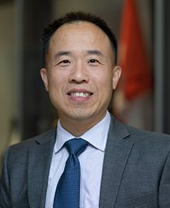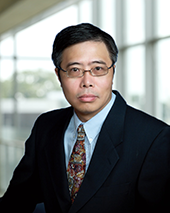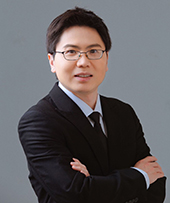 Keynote Speakers(Alphabetize by Last Name)
Keynote Speakers(Alphabetize by Last Name)
 Prof. Xili Duan, Memorial University of Newfoundland, Canada
Specch title: Drag Reduction with Marine Coatings for Greener Shipping
Prof. Xili Duan, Memorial University of Newfoundland, Canada
Specch title: Drag Reduction with Marine Coatings for Greener Shipping
Dr. Xili Duan is a Professor and Deputy Head (Graduate Studies) in mechanical engineering at the Memorial University of Newfoundland in Canada. Professor Duan received his Ph.D. degree in mechanical engineering from the University of Manitoba, followed by postdoctoral training at the Massachusetts Institute of Technology. Dr. Duan’s research interests include interfacial fluid mechanics and heat transfer, with applications in energy conversion and storage, thermal management, drag reduction, and protection of engineering structures in harsh marine environments. He has made significant research contributions, including three book chapters and over 150 journal and conference papers. Dr. Duan received several awards and honors, including the Dean’s Award for Research Excellence and the 2019 Terra Nova Young Innovator Award. Dr. Duan is a registered Professional Engineer in Canada and a member of the American Society of Mechanical Engineers (ASME). He is a Fellow of the Canadian Society for Mechanical Engineering (CSME) and was chair of the CSME Technical Committee on Advanced Energy Systems.
 Prof. Henry Hu, University of Windsor, Canada
Specch title:
Enhancement of corrosion resistance of wrought Al-Mg-Si alloy for auto application
Dr. Hongfa (Henry) Hu is a tenured full Professor at Department of Mechanical, Automotive & Materials Engineering, University of Windsor. He was a senior research engineer at Ryobi Die Casting (USA), and a Chief Metallurgist at Meridian Technologies, and a Research Scientist at Institute of Magnesium Technology. He received degrees from University of Toronto (Ph.D., 1996), University of Windsor (M.A.Sc., 1991), and Shanghai University of Technology (B.A.Sc., 1985). He was a NSERC Industrial Research Fellow (1995-1997). His publications (over 200 papers) are in the area of magnesium alloys, composites, metal casting, computer modelling, and physical metallurgy. He was a Key Reader of the Board of Review of Metallurgical and Materials Transactions, a Committee Member of the Grant Evaluation Group for Natural Sciences and Engineering Research Council of Canada, National Science Foundation (USA) and Canadian Metallurgical Quarterly. He has served as a member or chairman of various committees for CIM-METSOC, AFS, and USCAR. His current research focuses on materials processing and evaluation of light alloys and composites. His recent fundamental research is focussed on transport phenomena and mechanisms of solidification, phase transformation and dissolution kinetics. His applied research has included development of magnesium automotive applications, cost-effective casting processes for novel composites, and control systems for casting processes. His work on light alloys and composites has attracted the attention of several automotive companies.
Prof. Henry Hu, University of Windsor, Canada
Specch title:
Enhancement of corrosion resistance of wrought Al-Mg-Si alloy for auto application
Dr. Hongfa (Henry) Hu is a tenured full Professor at Department of Mechanical, Automotive & Materials Engineering, University of Windsor. He was a senior research engineer at Ryobi Die Casting (USA), and a Chief Metallurgist at Meridian Technologies, and a Research Scientist at Institute of Magnesium Technology. He received degrees from University of Toronto (Ph.D., 1996), University of Windsor (M.A.Sc., 1991), and Shanghai University of Technology (B.A.Sc., 1985). He was a NSERC Industrial Research Fellow (1995-1997). His publications (over 200 papers) are in the area of magnesium alloys, composites, metal casting, computer modelling, and physical metallurgy. He was a Key Reader of the Board of Review of Metallurgical and Materials Transactions, a Committee Member of the Grant Evaluation Group for Natural Sciences and Engineering Research Council of Canada, National Science Foundation (USA) and Canadian Metallurgical Quarterly. He has served as a member or chairman of various committees for CIM-METSOC, AFS, and USCAR. His current research focuses on materials processing and evaluation of light alloys and composites. His recent fundamental research is focussed on transport phenomena and mechanisms of solidification, phase transformation and dissolution kinetics. His applied research has included development of magnesium automotive applications, cost-effective casting processes for novel composites, and control systems for casting processes. His work on light alloys and composites has attracted the attention of several automotive companies. Prof. Liang Tian, Xi’an Jiaotong University, China
Specch title:Developing metal-based conductive composites for applications in electric power transmission cables and flexible printed electronics
Prof. Liang Tian, Xi’an Jiaotong University, China
Specch title:Developing metal-based conductive composites for applications in electric power transmission cables and flexible printed electronics